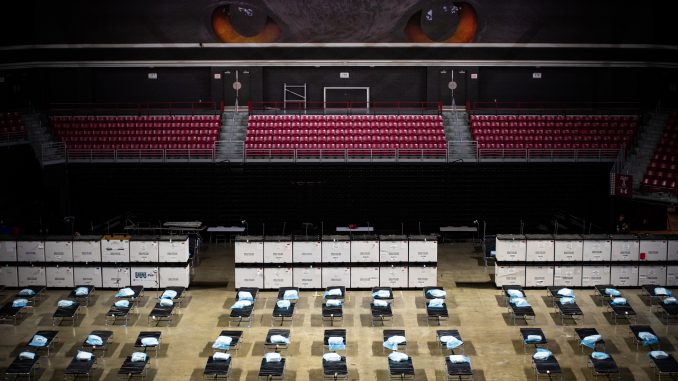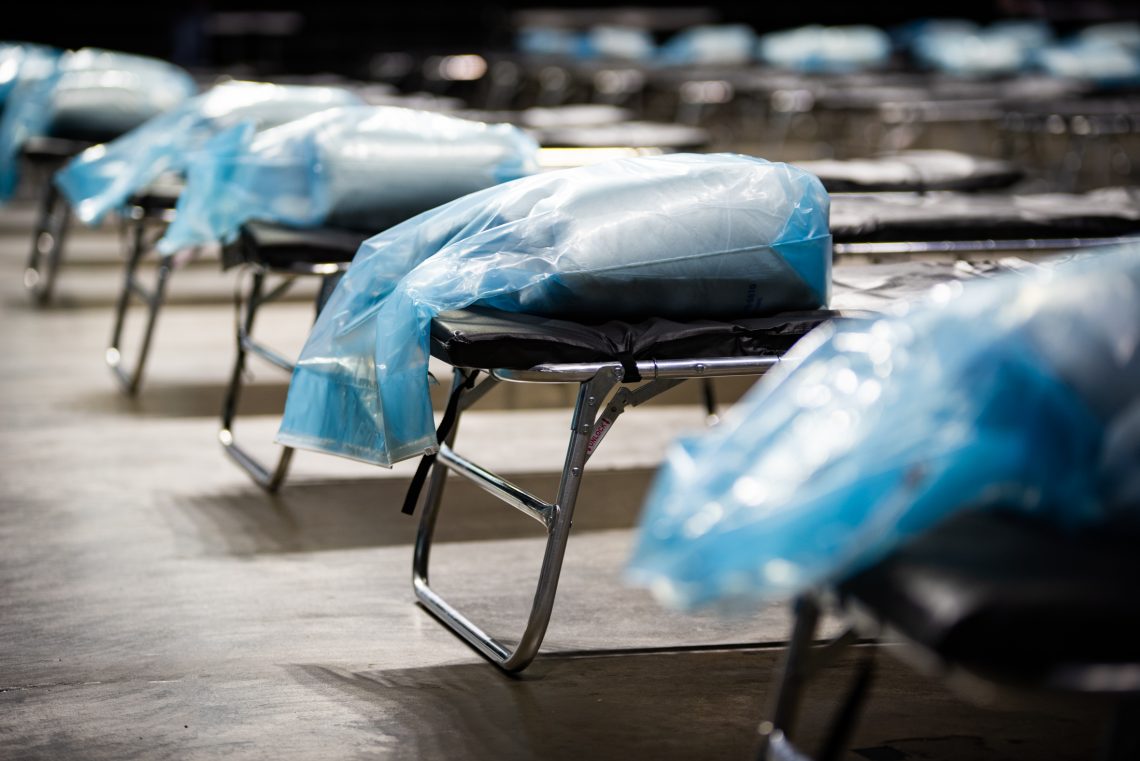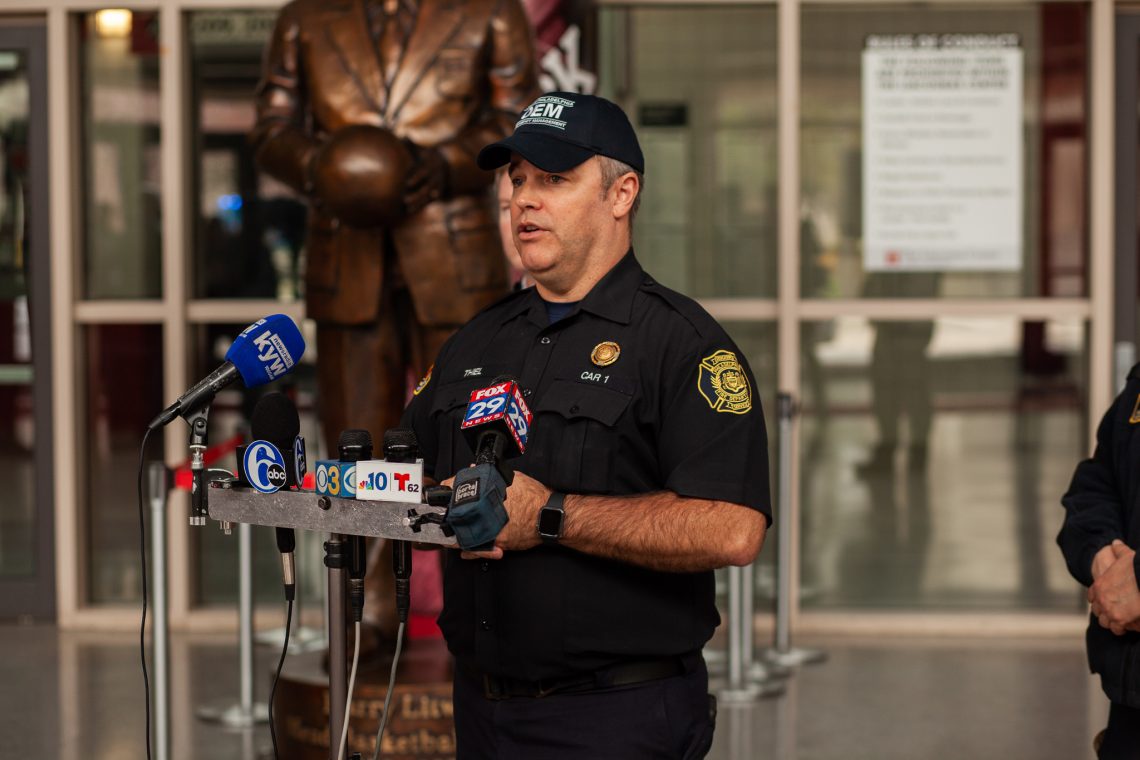
Many details surrounding how Temple University’s Liacouras Center would be used as a makeshift hospital during a surge in COVID-19 cases remain unknown as officials continue to assess how severely the pandemic will impact the city’s hospitals.
“The challenge with this event, there’s a term in what we do in emergency management: ‘planning, not plans,’” Fire Commissioner Adam Thiel said at a press conference at the Liacouras Center Monday morning. “So right now, this is an extremely dynamic situation, as everybody watching the news knows.”
Around the country, cities and hospitals are preparing for a surge in patients as confirmed cases of the virus continue to double every three days, the Washington Post reported. New York City’s convention center is being turned into a temporary hospital while floating hospitals from the U.S. Navy are on their way to Los Angeles. States are being forced to compete for funding and equipment from the federal government, the Post reported.
The Liacouras Center is preparing to hold up to 200 patients but could be expanded if necessary, Thiel said.

The makeshift hospital will only be used if other local hospitals are too overwhelmed with a surge in COVID-19 patients, The Temple News reported. It is not known yet whether the Liacouras Center would house patients who have the virus or not, Thiel said, though the university indicated it would initially be used as overflow for non-COVID-19 patients.
“We certainly hope that this surge capability is something that will essentially sit here, and hopefully, we’ll pack it up at the end of this thing and we’ll never hit that surge,” Thiel said.
Inside the center, dozens of beds line the basketball court where the Owls usually compete, with shadows being cast by the center’s bright overhead lights onto the floor.
If soap and water are not available, use alcohol-based hand sanitizer with at least 60 perecent alcohol. If you cough or sneeze, wash your hands immediately after.
Avoid touching your eyes, nose, and mouth with unwashed hands.
Clean high-touch surfaces, like tabletops, doorknobs, toilets, keyboards and tablets. Use a household cleaner to disinfect the surfaces.
The makeshift hospital continues to be set up as the city recruits volunteers and gathers medical equipment, Thiel added.
“The good news is right now, we don’t need it to be fully operational, so we’ve had the opportunity to take some time and continue to bring these resources together,” Thiel said.
The peak of the virus that might cause such a surge is expected in Philadelphia mid-May, said J. Larry Jameson, the dean of the University of Pennsylvania’s Perelman School of Medicine, Philadelphia Magazine reported.
As of now, city hospitals have the ability to manage their patient levels, Thiel said. When the peak of the virus arrives depends on how well Philadelphians practice social distancing to “flatten the curve,” or spreading out the number of cases over a longer period of time, he added.
The Philadelphia’s Department of Public Health, supported by Temple, Spectra, which manages the Liacouras Center, the city’s Office of Emergency Management and other partners, would manage medical operations at the Liacouras Center, Thiel said.
Temple announced Friday it had volunteered its space to the city, The Temple News reported, a day after the city announced it had ended negotiations with Joel Freeman, the owner of the former Hahnemann University Hospital, to potentially use that space as a surge hospital, PhillyVoice reported.

“We’re just happy to be in a position to help,” said Joe Sheridan, the general manager of the Liacouras Center. “This issue is global, national, and here in our city, so we’re just very happy to be, you know, in a position to help. And we’re working together with all the partners to make sure we can provide a good host to this surge medical facility.”
How the hospital is staffed will depend on how many volunteers the city can recruit through the Medical Reserve Corps and who is available from local hospitals and other sources, Thiel added.
“We know there are supply and staffing shortages across the nation, and we also know that as it stands right now, we are in a better situation than many of our peers,” he said. “We hope to stay that way.”
“But we are always planning for the next thing and we’ll be ready to pivot and adapt to anything that comes along, because this is Philadelphia, and that’s what we do,” Thiel said.


Be the first to comment